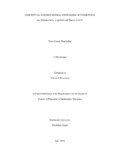
Please use this identifier to cite or link to this item:
https://hdl.handle.net/20.500.14301/359| Title: | Conceptual and Procedural Knowledge of Students in Mathematics: A Mixed Method Study' was presented on October |
| Authors: | Manandhar, Netra Kumar |
| Citation: | Manandhar,N.K.(2018).Conceptual and procedural knowledge of students in mathematics: a mixed method study . |
| Issue Date: | Jul-2018 |
| Publisher: | Kathmandu University School of Education |
| School: | SOED |
| Department: | DOSE |
| Level: | Masters |
| Program: | Master of Education in Mathematics Education |
| Abstract: | What is knowledge of mathematics? Is it a process to be skilled, or a concept to be understood deeply or both? This has been an issue among the mathematics teachers, teacher educators as well as researchers who are in/directly related to mathematics and mathematics education. This issue ultimately leads to the debate on procedural or conceptual or both type of knowledge construction in mathematics. In Nepal, we (as a teacher and a students of mathematics) have been facing this issue since very long in teaching and learning mathematics. At the same time, students develop knowledge of algebra in the middle school grades through both ways: procedural knowledge (PK) and conceptual knowledge (CK). As I experienced as a teacher of mathematics, sometimes, students acquire the knowledge of algebra by understanding the underlying concept whereas most of the time through step – by – step procedures in problem-solving. So, based on my experience, I can say that our students have both types of knowledge in this level. However, the question is how much procedural or conceptual knowledge of algebra they acquiring. This explanatory sequential mixed method study was carried out to figure out ii the level of conceptual and procedural knowledge in algebra including the relationship between these two variables. Next, to explore why students had such knowledge in the domain of knowledge that was to find the possible reasons behind the situation. The major emphases in this study were students' ability to define concepts in algebra, compare two or more algebraic expression, represent the concept with figures and diagrams, and express verbal problems into mathematical sentences and critical thinking. In the quantitative setting, the survey was conducted among 360 respondents of eight grader sample participants of 9 public schools of Kathmandu Metropolitan City. The first phase interview was taken with six participants using the semi-structured questionnaires to verify the result from the survey using student’s test papers. Similarly, the second phase interview was taken with the same six respondents of the first phase and a group discussion was done with four mathematics teachers who teach in the same level. The survey data analysis revealed that there was a low level of conceptual knowledge (average-8.56 out of 20) in algebra and it was below the average. Students had higher procedural knowledge (average-14.05 out of 20) but there was an average positive correlation (r = 0.559, p < 0.05) between these two knowledge. The first phase interview analysis disclosed that our students are still weak in reasoning, critical thinking, have less ability to compare two or more algebraic quantities as well as incapable to represent knowledge with diagrams and pictures. The second phase interview and a group discussion with teachers regarding why students had such situation disclosed that there was a poor interest of students in learning algebra. The less use of effective teaching-learning approaches, lack of connecting daily life problems with contextual examples in teaching /learning, less project work, practical and field work inside as well as outside the classroom were the phenomenal reasons iii which show that we all are unable to construct conceptual knowledge in comparison to procedural knowledge in algebra. The major implication of this study is; we need to prioritize the conceptual knowledge construction in mathematics without neglecting procedural knowledge. For this, teachers need to be aware and trained to implement effective teaching and learning approaches, teaching materials, different project and practical works that enrich the conceptual knowledge. Policy makers need to be aware of making policies towards developing CK. The curriculum developers should develop effective mathematics curriculum and plans that nurtures CK and other education related buddies including parents should emphasize conceptual mathematics knowledge development. |
| URI: | https://hdl.handle.net/20.500.14301/359 |
| Appears in Collections: | Dissertation |
Files in This Item:
| File | Description | Size | Format | |
|---|---|---|---|---|
| CK and PK of Students in Mathematics (A Mixed Method Study-Final).pdf | 2.39 MB | Adobe PDF |  View/Open |
Items in DSpace are protected by copyright, with all rights reserved, unless otherwise indicated.